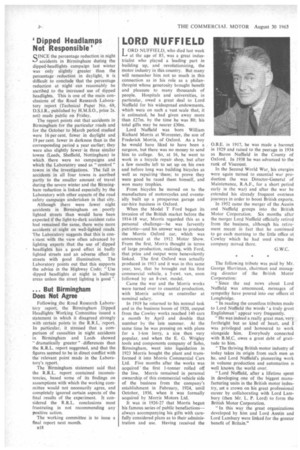LORD NUFFIELD
Page 36

If you've noticed an error in this article please click here to report it so we can fix it.
LORD NUFFIELD, who died last week Le at the age of 85, was a great industrialist who played a leading part in building up, and revolutionizing, the motor industry in this country. But many will remember him not so much in this connection as in his role as a philanthropist whose generosity brought benefit and pleasure to many thousands of people. Hospitals and universities, in particular, owed a great deal to Lord Nuffield for his widespread endowments, which were on such a vast 'scale that, it is estimated, he had given away more than £27m. by the time he was 80; his total gifts may be nearer £30m.
Lord Nuffield was born William Richard Morris at Worcester, the son of Frederick Morris, of Oxford. As a boy he would have liked to have been a surgeon, but there was no money to send him to college. So, at 16, he went to work in a bicycle repair shop, but after a few months left to set up on his own and before long was building bicycles as well as repairing 'them; to prove they were good he raced them himself, and won many trophies.
From bicycles he moved on to the manufacture of motorcycles and eventually built up a prosperous garage and car-hire business in Oxford.
When the Model T Ford began its invasion of the British market before the 1914-18 war, Morris regarded this as a personal challenge—he was fervently patriotic—and his answer was to produce the Morris Oxford car, which was announced at the 1912 Motor Show. From the first, Morris thought in terms of large production, realizing, with Ford, that price and output were benevolently linked. The first Oxford was actually produced in 1913 and it was in this same year, too, that be brought out his first commercial vehicle. a 5-cwt. van, soon followed by an 8-cwt. model.
Came the war and the Morris works were turned over to essential production, with Morris acting as controller at nominal salary.
In 1919 he returned to his normal task and in the business boom of 1920, output from the Cowley works reached 140 cars a month by April and double that number by the late summer. At the same time he was pressing on with plans for a 1-ton lorry, a size then very popular, and when the E. G. Wrigley tools and components company of Soho, Birmingham, went into liquidation in 1923 Morris bought the plant and transformed it into Morris Commercial Cars Ltd. Five months after the works was acquired ' the first 1-tonner rolled off the line. Morris remained in personal ownership of this commercial vehicle side of the business from the company's establishment in February, 1924, until October, 1936, when it was formally acquired by Morris Motors Ltd.
It was in 1926-27 that Morris began his famous series of public benefactions— always accompanying his gifts with carefully considered plans as to their administration and use. Having received the O.B.E. in 1917, he was made a baronet in 1929 and raised to the peerage in 1934 as Baron Nuffield in the County of Oxford. In 1938 he was advanced to the rank of Viscount.
In the Second World War, his energies were again turned to essential war production (he was Director-General of Maintenance, RAE, for a short period early in the war) and after the war he extended his already frequent overseas journeys in order to boost British exports.
In 1952 came the merger of the Austin and Nuffield groups into the British Motor Corporation. Six months after the merger Lord Nuffield officially retired from the business, although his retirement meant in fact that he continued to go each morning to the little office at Cowley which he had used since the company moved there.
The following tribute was paid by Mr. George Harriman, chairman and managing director of the British Motor Corporation: "Since the sad news about Lord Nuffield was announced, messages of sympathy have poured into our offices at Longbridge.
"In reading the countless tributes made to Lord Nuffield the words a truly great Englishman' appear very frequently.
"He was indeed a really great man, very forthright but so kind of heart, and I was privileged and honoured to work alongside him. Everybody connected with B.M.C. owes a great debt of gratitude to him.
"The thriving British motor industry of today takes its origin from such men as he, and Lord Nuffield's pioneering work in volume production and automation is well known the world over'.
"Lord Nuffield, after a lifetime spent in developing one of the biggest manufacturing units in the British motor industry, set a crown on his great professional career by collaborating with Lord Lambury (then Mr. L. P. Lord) to form the British Motor Corporation.
"In this way the great organizations developed by him and Lord Austin and Lord Lambury were linked for the greater benefit of Britain."




































































































